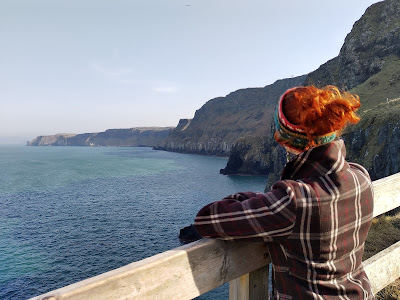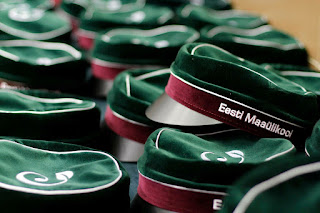The Second Year, part I: Conference
While spring still can't decide whether to come all the way to Estonia, we are packing our bags and leave. Three days of education are awaiting us on the shore of the lake Pühajärv: it's a winter school for PhD students of immunology and virology, and while most participants are from Tartu, some arrive from as far as Northern Sweden. A bus is picking us up from the parking lot of the Vanemuine Theater, and we look around. We will spend almost an hour in this bus, and three days in the same conference room, in the same dining hall, we will share hotel rooms. A decision is quietly made, as we all take off our protective face masks. If one of us has Covid, we will all get it anyway.
There is no
PhD student who doesn't know the PhD comics by Jorge Cham (www.phdcomics.com),
which depict our life so accurately. There is one comic strip in particular
that matches this trip: Career stages at a seminar - the first year graduate
student will take notes, thinking she will ever look at them again. Third years
have brought reading materials and barely listen. PostDocs came because they
have nothing better to do. Associate professors will be working on three grant
proposals at the same time. And the professor in the back brought his newest
tech gadget.
Well, it's
not exactly like this, but almost. Most people are listening and asking
questions. There are discussions during coffee breaks. I take notes when the
lecture focuses on the interactions of microbiota and the immune system. But I
do have my laptop in front of me, so I can download the articles they refer to
right away. And then I open the window with my colleague Rohish's manuscript
again. The deadline is in two days, and the text needs a lot of work. During
lunch break, I take a walk on the frozen lake with a newfound fellow. Later, my
supervisor suddenly sits next to me. He will give a talk later today, the only
veterinarian among all these biologists who research human problems on mice.
"Do you understand what he's talking about?" he whispers. I have
scribbled a few notes down and my laptop shows the ResearchGate profile of the
presenter (that's social media for geeks, it's only to present your research).
"Kind of, yes", I whisper back. "The systemic effect of the gut
microbiota on the immune system is connected to interferons, which are involved
in the response to viral infections. But he lost me when he explained the
molecular mechanism."
A
notification pops up on my phone. "Exciting, right?" My colleague
Elisabeth is watching the conference from home.
My boss
leans over to me once again. "Should we measure the interferon gamma in
the calves’ blood?"
I nod and reply to Elisabeth that we are already planning our next project.
Usually, scientists have a clear question when they start out. There is a lack of knowledge, and ultimately, we want to heal something. They ask their specific question, find a method to answer it, and then do that. Toomas' presentation is different. He tells us the story of how he went to Helsinki and had to learn a laboratory method. There was some reindeer blood left over from another project, so that's what he used. Then he had to practice using the statistical program, and he used the results from the reindeer blood for that. That was how he discovered something: The completely healthy newborn reindeer showed an immune response. Not only that, the concentrations of the immune markers were related to how much weight the animals gained over the next months. He could measure proteins in the first weeks of life and basically predict the growth of reindeer. This changed everything. Young Toomas spent the rest of his PhD studies exploring this phenomenon in other ruminant species. Then he supervised his own PhD students, trying to understand the phenomenon. Today, twenty years after his discovery, he still doesn’t know what it behind it. But, he nods in my direction, we are working on deciphering it. Maybe the colonization of the intestines with bacteria have something to do with it - they could cause an immune response without symptoms, and also influence weight gain. Our research group did not have a clear question; we had a mysterious phenomenon. My dissertation does not have a clear question; I have to figure out how to make one out of my problem. We had samples. We had data. And we wanted to understand a phenomenon that was found accidentally. Toomas can't give the audience a clear answer either. It seems sad, but other people later tell me that they found his presentation fascinating, and I, of course, and excited about the research. We may not have a clear question and answer, but we have a story to tell.
In the evening, we are supposed to relax. It is a spa-hotel after all; there is a bar, a sauna, and a pool. Instead, Rohish and I sit in the lobby, working on his manuscript, making it good enough that he can send it to his supervisor. This is not a vacation.
As soon as I'm back home, I pack my bag again. The Estonian delegation of eight scientists is going to Belfast, Northern Ireland. This is my first international conference, the annual meeting of the Society of Veterinary Epidemiology and Preventive Medicine; last year, it took place online. This year, we don't even have to wear masks. "If we do take Covid home", the president of the society says in her opening speech, "someone should present the chain of transmission next year. We are epidemiologists after all."
After an
interactive workshop about planning epidemiological studies, the presentations
start - but everything is far bigger than in Pühajärve. We sit on the gallery
of a big conference center in the Belfast city center and try to learn as much
as possible. Downstairs, one walks between scientific posters with their coffee
cup in hand and discusses the research projects. I also present my preliminary
results on a big poster and get some input from seasoned scientists. Next door,
the food is served, researchers from all over Europe sit together and exchange
their stories - what they work on, where they're from, and how they got to
where they are now. "So you guys are all from Estonia?” a French
veterinarian asks us. Four of us PhD students sit with him. "Well."
We laugh. "Yes, we all work there and came on the same plane, but
actually, none of us has an Estonian passport - Finland, Ukraine, Germany, and
India."
The main purpose of such a conference is to network. Meet the people who can inspire you, work with you. Share anecdotes. Instead of sending Facebook friend requests, we follow each other on ResearchGate and LinkedIn. The evenings are for fancy dinners in hotels, and Elisabeth and I become friends with two Dutch university employees.
This goes on for three days. Apart from the content, the presentations are also interesting in regards to how the people speak. The difference between experienced lecturers who speak freely and make an occasional joke and the young scientists who stand on a stage for the first time and shyly read from their slides is baffling. I already start dreaming of standing on that stage one day talking about my research about intestinal microbiota of lambs and calves...
Such
conferences seem to be a great way to travel to many places, but you barely get
to see anything other than your hotel and the conference venue. This is work,
after all. But fortunately, we booked our flight with some buffer, so we do
have time for a little sight seeing. I sigh at breakfast. "We are so close
to such beautiful nature!"
Elisabeth takes out her phone. "Let's rent a car!"
Two hours later the four PhD students from Estonia are on their way to the coast. Feeling the salty wind in our faces as we take a walk on the cliffs in the sunshine feels like a holiday. We couldn't have done anything better with this extra day than to go to the "Giant's Causeway" and see with our own eyes what Ireland prints on their postcards.
After another walk through the city center of Belfast and a dinner in a pub that a professor invited us to, we are on our way again. The trip to the UK had been stressful, with only half an hour to transfer in Helsinki, which is not a lot when you have to go through passport control as we're laving the EU, and even less when the first plane is late. We brace ourselves for this as we show our passports the first time in Belfast. No, we do not all have the same nationality. Yes, we are all on the same plane to London. Then London-Helsinki. We start running. No time to refill our water bottles. Rohish carries the big tube with all our posters. Out of breath, we reach the gate. Only to see that it just changed and we have to run back to the other end of the terminal. The other two make it in, but Elisabeth's and my tickets only get a red light. Overbooked. It is quite stormy, and landing in Helsinki was already turbulent. Maybe it wouldn't be too bad if we had to wait for the next flight? The connections between Helsinki and Tallinn are quite frequent. But the other two are supposed to drive to Tartu with us, and I have the car keys. A few minutes later, they call our names. There were two empty seats after all. We arrive in Tallinn almost without turbulences. The only worry we now have is Elisabeth's sore throat, so we buy Covid rapid tests at the first gas station. "If one of us is positive, we all have it", I say, as we wait for the stripes to appear.
Two days
later, we are all in our beds with a fever. But at least we are at home.






Es klingt nach einer intensiven, aber gleichzeitig sehr lehrreichen Erfahrung für die PhD-Studenten! Wenn auch du mit einer akademischen Arbeit beschäftigt bist und Unterstützung benötigst, kann es hilfreich sein, auf hausarbeit schreiben lassen zurückzugreifen, um eine qualitativ hochwertige Hausarbeit zu schreiben. So bleibt mehr Zeit, sich auf wichtige Konferenzen und Seminare zu konzentrieren!
AntwortenLöschen